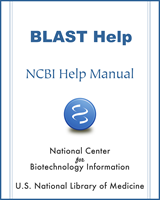BLAST is a Registered Trademark of the National Library of Medicine
NCBI Bookshelf. A service of the National Library of Medicine, National Institutes of Health.
BLAST® Command Line Applications User Manual [Internet]. Bethesda (MD): National Center for Biotechnology Information (US); 2008-.
Privacy Statement
As part of our effort to improve BLAST+, we have implemented usage reporting to collect limited data. This information shows us whether BLAST+ is being used by the community, and therefore is worth being maintained and developed by NCBI. It also allows us to focus our development efforts on the most used aspects of BLAST+. If possible, please report your usage, so we can continue to support and develop BLAST+ to best suit your needs.
You can easily opt-out of sending information about your searches if you wish by following the instructions below. This offers you greater privacy control than sending searches over the internet using web tools or the -remote option on a BLAST+ executable, which also accesses the web service.
Information sent back to NCBI is limited to the name of the BLAST program, database metadata, a few BLAST parameters, as well the number and total size of your queries without any data association that might reveal the context of your research. No sequences from your queries or database are sent to the NCBI. An example set of data from a BLAST search is provided below. More information about each item is shown in the table following the list.
IP=27.18.28.18
comp_based_stats=2
db_date=Aug 26, 2020 3:12 AM
db_length=179658219
db_name=swissprot
db_num_seqs=474714
evalue_threshold=10.000000
exit_status=0
hitlist_size=500
ncbi_app=standalone-blast
ncbi_location=be-md
ncbi_role=production
num_queries=1
num_threads=2
os=UNIX
output_fmt=11
program=blastp
queries_length=656
run_time=3.076507
task=blastp
version=2.11.0
|
Reported parameter |
Description |
|
IP |
The apparent IP address of the machine running BLAST |
|
comp_based_stats | Composition based statistics setting See Command-line options in the manual. |
|
db_date |
Creation date of the BLAST database |
|
db_length |
Length (size) of the database in letters (bases or amino acid characters) |
|
db_name |
BLAST database name |
|
db_num_seqs |
Number of sequences in the BLAST database. |
|
evalue_threshold | Expect value limit. |
|
exit_status | BLAST program exit status. The value ‘0’ indicates success. See the Exit codes in the manual for more information. |
|
hitlist_size | Number of matches to return. This is the same value as the max_target_seqs option. See Command-line options in the manual. |
|
ncbi_app |
Parameter used by NCBI application logging. All BLAST programs return ‘standalone-blast’ |
|
ncbi_location |
Default parameter for BLAST. Value always ‘be-me for (Bethesda, Maryland) |
|
ncbi_role |
Default parameter. Value always production. |
|
num_queries |
Number of query sequences in the BLAST search. |
Opt-out of Usage Reporting
You can opt-out of the usage reporting by adding a .ncbirc (UNIX like) or ncbi.ini (Windows) configuration file. In the configuration file you should add a line under the BLAST section to set BLAST_USAGE_REPORT to false. See here for details on setting up a configuration file.
You may also opt-out of the usage reporting by setting the environment variable BLAST_USAGE_REPORT to false. In bash (under LINUX) this command would be:
export BLAST_USAGE_REPORT=false
Note that this environment variable is only set in the shell (i.e., window) you are currently using and will not be set the next time you login. To permanently opt-out, this variable should be set every time a new shell is opened or with a configuration file, as described above.
You can also set this environment variable, turning off usage reporting, when using BLAST+ docker by adding the -e option to your docker invocation:
-e BLAST_USAGE_REPORT=false
The NLM privacy policy is available here.
- Privacy - BLAST® Command Line Applications User ManualPrivacy - BLAST® Command Line Applications User Manual
Your browsing activity is empty.
Activity recording is turned off.
See more...
